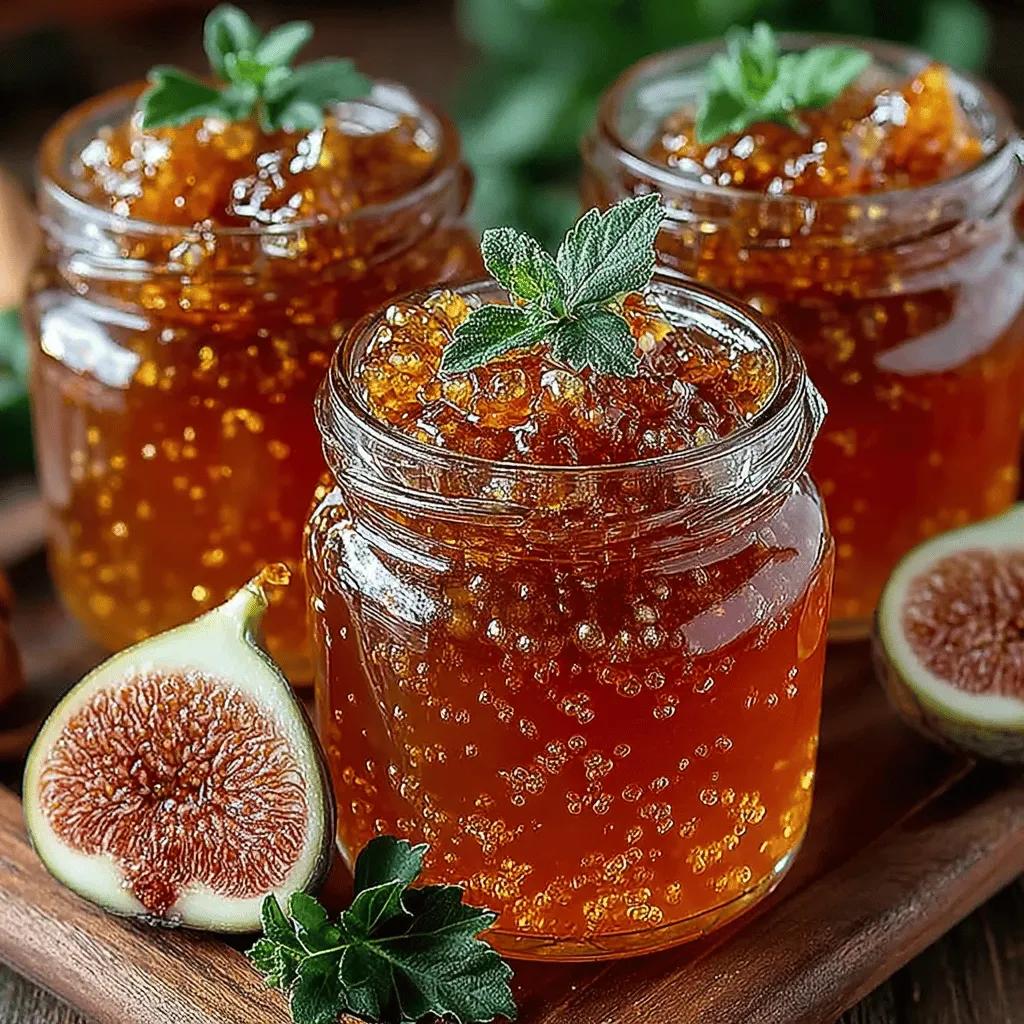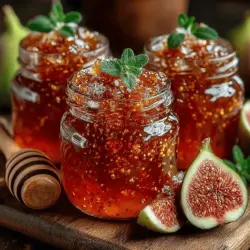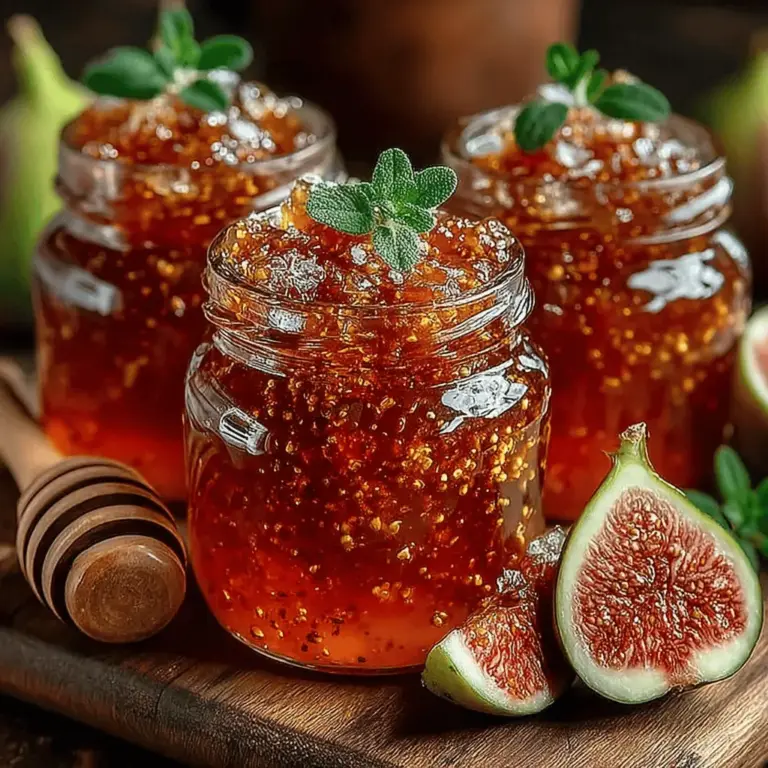Introduction
There’s something uniquely satisfying about crafting homemade jams. The process transforms simple ingredients into a delightful spread that captures the essence of seasonal fruits, ready to be enjoyed on toast, in desserts, or as a glaze for savory dishes. Among the many fruit preserves, fig jam stands out with its rich, complex flavor and luxurious texture. Figgy Delight Jam, in particular, celebrates the sweet, honeyed essence of fresh figs, inviting you to embrace its versatility in both sweet and savory culinary creations.
Figs, with their unique taste and myriad health benefits, are a wonderful choice for jam-making. These fruits are loaded with nutrients, including fiber, vitamins, and antioxidants, making them not only delicious but also a wholesome addition to your diet. By using fresh ingredients, you ensure that your jam is bursting with flavor and maintains its nutritional integrity, allowing you to indulge guilt-free.
Understanding Figs: Nature’s Sweet Gems
Figs have a rich history that dates back thousands of years, with origins tracing back to the Mediterranean region. These luscious fruits have been cherished not only for their sweet and succulent flavor but also for their symbolic significance in various cultures. Today, figs come in several varieties, including Black Mission, Kadota, and Adriatic, each offering distinct flavor profiles and textures. Black Mission figs, for instance, are known for their deep purple skin and rich, sweet flesh, making them an ideal choice for jam.
Nutritionally, figs are a powerhouse. They are high in dietary fiber, which aids digestion and helps maintain a healthy weight. Additionally, figs are rich in essential vitamins and minerals, such as vitamin B6, potassium, and magnesium. Their natural sweetness means you can often use less added sugar in recipes, which is a significant advantage for those looking to cut down on refined sugars.
Fresh ingredients are crucial in jam-making, as they significantly impact the flavor, texture, and overall quality of the final product. Using ripe, flavorful figs ensures that your Figgy Delight Jam is not only tasty but also showcases the delightful characteristics of the fruit itself. The combination of fresh figs with just the right amount of sweetness and acidity creates a jam that is perfectly balanced and incredibly satisfying.
Ingredients Breakdown: Essential Components of Figgy Delight Jam
To make Figgy Delight Jam, you’ll need a handful of simple yet essential ingredients. Each component plays a vital role in achieving the perfect balance of flavor and texture.
– Fresh Ripe Figs: The star of the show, ripe figs bring their natural sweetness and a unique, chewy texture to the jam. When selecting figs, look for those that are plump and slightly soft to the touch, indicating ripeness. Their natural sugars will caramelize during cooking, enhancing the jam’s flavor profile.
– Granulated Sugar: Sugar serves a dual purpose in jam-making: it sweetens the mixture and acts as a preservative. The sugar helps to create the gel-like consistency essential for jam, as it interacts with the pectin found in the fruit.
– Freshly Squeezed Lemon Juice: This ingredient is crucial for balancing the sweetness of the figs and adding a touch of acidity. The acidity from the lemon juice not only enhances the flavor but also helps to preserve the jam, ensuring it maintains its vibrant color and taste.
– Water: While it may seem like a simple addition, water aids in the cooking process, helping to dissolve the sugar and create a smooth consistency.
– Vanilla Extract and Ground Cinnamon (Optional): These flavor enhancers can elevate your fig jam to new heights. Vanilla adds a warm, aromatic note, while cinnamon introduces a hint of spice that beautifully complements the natural sweetness of the figs.
– Salt: Just a pinch of salt can enhance the overall flavor profile of the jam, balancing the sweetness and adding depth.
Step-by-Step Guide to Making Figgy Delight Jam
Now that we’ve covered the ingredients, it’s time to delve into the step-by-step process of making Figgy Delight Jam. The first crucial step is preparing the figs.
Preparing the Figs
Before you begin making your jam, it’s essential to properly wash and prepare the figs. Start by rinsing the figs gently under cool running water to remove any dirt or residue. Next, pat them dry with a clean kitchen towel.
When it comes to cutting the figs, visual cues are vital. Look for figs that are ripe but not overly mushy. A well-ripened fig will yield slightly when pressed, and its skin will have a slight sheen. For best results, quarter the figs with a sharp knife. This technique not only maintains their texture but also allows them to break down evenly during the cooking process.
As you quarter the figs, be mindful not to discard any seeds, as they contribute a delightful crunch and texture to the jam. The goal is to retain the integrity of the figs while ensuring an even distribution of flavor throughout the jam.
Combining Ingredients: The Science of Flavor Melding
Once your figs are prepared, it’s time to combine them with the other ingredients. Begin by placing the quartered figs in a large, heavy-bottomed pot. Add the granulated sugar, freshly squeezed lemon juice, and water. If you’re opting for the optional vanilla extract and ground cinnamon, add those as well.
Stir the mixture gently, allowing the sugar to coat the figs and start dissolving. As the ingredients meld together, you’ll notice the figs releasing their juices, creating a syrupy base for your jam.
Now, it’s essential to let the mixture sit for about 30 minutes. This resting period enables the figs to macerate in the sugar, enhancing their flavor and ensuring a smoother consistency when cooked.
After the figs have had time to macerate, place the pot over medium heat. Bring the mixture to a gentle simmer, stirring frequently to prevent sticking and ensure even cooking. As the figs heat up, they will begin to break down, releasing their natural sweetness and creating a rich, fragrant jam.
This initial phase is where the magic begins. The combination of heat and time allows the flavors to develop fully, resulting in a Figgy Delight Jam that captures the essence of fresh figs in every spoonful.
As you embark on this sweet journey from orchard to jar, be prepared to enjoy not only the process but also the delightful rewards of your homemade creation.

How Ingredients Interact During Cooking
Understanding how the ingredients interact during the cooking process is vital for creating the perfect Figgy Delight Jam. Figs, with their natural sugars and unique texture, provide a base that melds beautifully with the acidity from lemon juice. This acidity not only balances the sweetness but also helps in the preservation of the jam over time. Pectin, a natural thickening agent found in fruits, is released when figs are cooked, thickening the mixture as it simmers. Sugar, on the other hand, plays a dual role; it sweetens the jam and assists in the gelling process, transforming the mixture into a luscious spreadable treat.
Best Practices for Mixing to Ensure Even Distribution
When preparing your fig jam, thorough mixing is crucial to ensure that all ingredients are evenly distributed. Start by gently stirring the figs and sugar together before adding heat. This step helps to coat the figs with sugar, drawing out their juices and enhancing the flavor. As the mixture cooks, continue to stir occasionally, ensuring that the sugar dissolves completely and that the figs do not stick to the bottom of the pot, where they could burn.
Cooking Process: Transforming Ingredients into Jam
Cooking the Mixture: Importance of Heat Control
Heat control is one of the most critical aspects of making jam. Begin by bringing the mixture to a boil over medium heat. Once boiling, reduce the heat to maintain a gentle simmer. Boiling too vigorously can cause the jam to cook unevenly and may lead to scorching. A steady, controlled heat ensures that the sugars dissolve properly and the figs break down gradually.
Explanation of the Sugar Dissolution Process
As the mixture heats, the sugar will begin to dissolve, creating a syrupy consistency. This process is essential because undissolved sugar can lead to a grainy texture in your finished jam. Keep an eye on the mixture, and stir gently to help the sugar dissolve evenly. Once the sugar is fully integrated, you will notice a glossy sheen on the surface of the jam.
Visual Indicators for Boiling and Simmering Stages
During the cooking process, certain visual indicators will signal that you are at the correct boiling or simmering stage. A rolling boil will bubble vigorously and create a frothy surface, while a gentle simmer will produce smaller, slower bubbles. Transitioning between these two stages is crucial; you want that initial boil to activate the pectin, followed by a simmer to allow the flavors to meld and develop.
Simmering for Perfection: Achieving the Right Consistency
The key to achieving the perfect jam consistency lies in the simmering stage. Allow the mixture to simmer for about 20-30 minutes, stirring occasionally. As it cooks, the mixture will thicken. You can check for consistency by using the plate test: place a small spoonful of jam on a cold plate and let it sit for a minute. Run your finger through the jam; if it holds its shape and does not flood back together, it is ready for jarring.
The Significance of Stirring to Prevent Burning
Throughout the cooking process, stirring is crucial. Not only does it prevent the jam from sticking to the bottom of the pot, where it can burn, but it also ensures that the heat is evenly distributed. Make it a habit to scrape the sides of the pot and incorporate any ingredients that may have settled. This practice will help you achieve a smooth, consistent texture.
Guidelines for Testing Jam Consistency
Testing the consistency of your jam is an essential step before jarring. Besides the plate test, you can also use a candy thermometer to check the temperature; for jam, you’re looking for a temperature of around 220°F (104°C). This temperature signals that the pectin has activated and your mixture is ready to be preserved.
Jarring Your Creation: Safety and Storage
Importance of Sterilizing Jars: Ensuring Food Safety
Before beginning the jarring process, it’s crucial to sterilize your jars to eliminate any bacteria that could spoil your jam. You can sterilize jars by placing them in a preheated oven at 220°F (105°C) for about 15 minutes or boiling them in water for 10 minutes. Don’t forget to sterilize the lids as well to ensure a proper seal.
Techniques for Pouring and Sealing the Jam into Jars
When pouring your hot jam into sterilized jars, use a funnel to prevent spills. Fill each jar to about 1/4 inch from the top to allow for proper sealing and expansion during cooling. Once filled, wipe the rims of the jars with a clean cloth to remove any residue before sealing them with the sterilized lids. This step ensures a tight seal, which is essential for long-term preservation.
Explanation of Headspace and Its Role in Preservation
Headspace refers to the space between the surface of the jam and the lid of the jar. Proper headspace is vital for maintaining the integrity of the seal and for the expansion of the jam during processing. Too little headspace can cause a jam to overflow, while too much can lead to air pockets that encourage spoilage. Aim for a headspace of about 1/4 inch for best results.
Cooling and Storage Tips: Best Practices for Flavor Development
After sealing your jars, allow them to cool at room temperature. Once cool, check the seals by gently pressing the center of each lid; if it does not pop back, the jar is sealed correctly. Store your sealed jars in a cool, dark place to enhance the flavor development. Homemade fig jam can typically be stored for up to a year, although the flavors will continue to mature over time.
Enjoying Figgy Delight Jam: Serving Suggestions and Pairings
Versatility of Fig Jam: Ideas for Using It in Various Dishes
Figgy Delight Jam is more than just a spread; it’s a versatile ingredient that can enhance a variety of dishes. Its rich, sweet flavor pairs well with both sweet and savory foods, making it an exciting addition to your culinary repertoire.
Spreads for Breakfast: Toast, Pancakes, and Waffles
Start your day with a delightful breakfast by spreading fig jam on warm toast, pancakes, or waffles. The sweet richness of the jam elevates simple breakfast staples, adding a touch of gourmet flair. For an extra indulgence, consider topping your pancakes with whipped cream or yogurt and a drizzle of fig jam for a deliciously sweet start to your day.
Incorporating into Savory Dishes: Glazes and Sauces
Fig jam can also be incorporated into savory dishes. Use it as a glaze for roasted meats, such as chicken or pork, to add a layer of sweetness that balances the savory flavors. Additionally, it can be mixed into sauces for a unique twist, lending depth and complexity to your dishes.
Pairing with Cheeses and Charcuterie Boards
One of the best ways to enjoy fig jam is by pairing it with cheeses and charcuterie on a cheese board. The sweetness of the jam complements sharp cheeses like aged cheddar or tangy goat cheese perfectly. Serve it alongside cured meats, crackers, and fresh fruits for an elegant appetizer or snack.
Conclusion
Making Figgy Delight Jam is not just about preserving fruit; it’s about creating a delicious experience that brings joy to every bite. From the rich flavors of fresh figs to the satisfaction of mastering the cooking process, every step of the way is rewarding. We encourage you to experiment with flavors, perhaps by adding spices like cinnamon or vanilla, and to share your delicious creations with friends and family. The art of preserving seasonal fruits into delightful jams is a timeless skill that brings the essence of summer into your pantry all year round. Embrace the joy of homemade fig jam, and let it inspire your culinary creativity!

